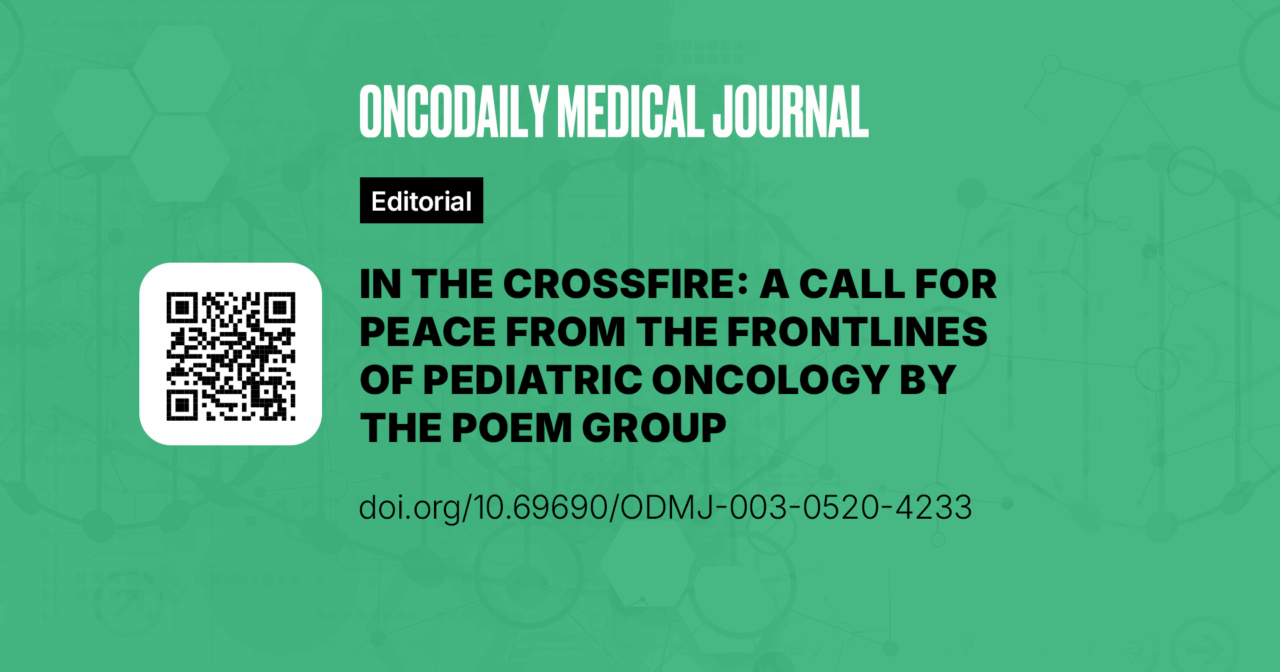In the Crossfire: A Call for Peace from the Frontlines of Pediatric Oncology by the POEM Group
Editorial
In a region where resilience is a daily ritual, where hospitals become sanctuaries against violence, and where children fight battles far beyond their age, the 4th Scientific Congress of the Pediatric Oncology East and Mediterranean (POEM) Group convened from April 30 to May 3, 2025. Held in the storied city of Amman, the congress brought together over 1,000 professionals from 28 countries, 110 pediatric cancer centers, and 20 non-profit organizations. But amidst the scientific presentations and clinical advancements, one discussion demanded more than data; it demanded conscience.
In our panel on Breaking Barriers in Pediatric Oncology, the conversation shifted, inevitably and unavoidably, toward war. Not in abstraction. Not in history books. But war as it lives and breathes in the lives of our patients – children with cancer who must face not only a diagnosis but displacement, fear, hunger, and silence.
We spoke not just as physicians and nurses, but as witnesses. We spoke of children whose chemotherapy was interrupted by shelling, of families torn apart at checkpoints, of operating rooms that fell silent as generators ran out of fuel. We spoke of hospitals turned into targets, of roads to radiotherapy turned into rubble. We spoke of courage – yes – but also of helplessness. And of the silence that often surrounds it.
It is this silence we find unacceptable.
Silence when bombs fall on cities with pediatric cancer centers. Silence when supply lines to oncology units are cut. Silence when immunocompromised children cannot access clean water or antibiotics. Silence when their pain becomes a footnote in diplomatic briefings.
Let us be clear: We are not politicians. We are medical professionals. We are surgeons, hematologists, oncologists, psychologists, nurses, and lab technicians. We do not choose sides in conflicts. We choose life. Every child we treat is our side. Every family we comfort is our mission. And in war, the first casualty is often the truth. The second is healthcare.
In this region, the East and Mediterranean, we know war too well. But we also know the quiet, relentless power of working together. At this congress, we stood on that truth. We honored the brave institutions that have shown up where others could not, the World Health Organization, St. Jude Children’s Research Hospital, King Hussein Cancer Center, the American University of Beirut Medical Center, 57357, Borg AlArab Hospitals, and countless others whose humanitarian response has often gone unrecognized but never unnoticed. They built bridges where borders had closed. They brought medicines when politics brought blockades. They reminded us that neutrality, when wielded in the service of the vulnerable, becomes a weapon of peace.
As POEM Group, we carry no flags. We carry the stories of children. And through their eyes, we see the stakes.
This statement is not only a reflection of the panel we held, but it is a declaration. We call upon governments, political actors, international agencies, and fellow medical professionals to do what conscience demands:
Speak up.
Speak up for peace, not in theory, but in the operating rooms and wards where children fight for one more day.
Speak up for safe passages, for medication, for patients, for humanitarian teams.
Speak up for accountability, so that no child becomes collateral damage to decisions made far from their bedside.
Speak up against weaponizing silence, for silence too can kill.
To our colleagues in war zones, know this: You are not alone. Your work matters. Your defiance, your duty, your dedication, it is noticed. The POEM Group stands with you, as do thousands across this region, who see medicine not as a profession, but a covenant.
To the world, we say: There is no acceptable number of children with cancer dying in wars. Not one. Not ever.
We believe that peace is not a political luxury; it is a medical necessity. And until it is achieved, we will not stop speaking, not stop caring, not stop fighting, not just cancer, but everything that threatens the right of a child to be treated, to be healed, to be whole.
From Amman, with all the urgency that reality demands,
Pediatric Oncology East and Mediterranean (POEM) Group
License
This article is published under the terms of the Creative Commons Attribution 4.0 International License (CC BY 4.0).
© The Pediatric Oncology East and Mediterranean Group, 2025. This license permits unrestricted use, distribution, and reproduction in any medium, provided the original author and source are credited.





